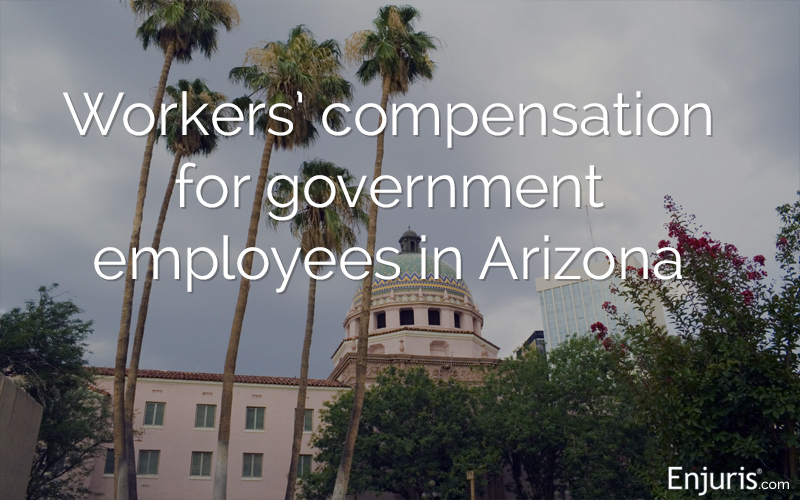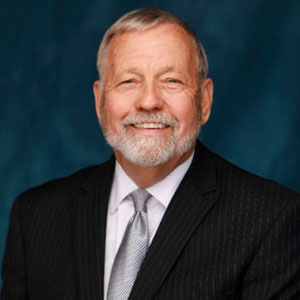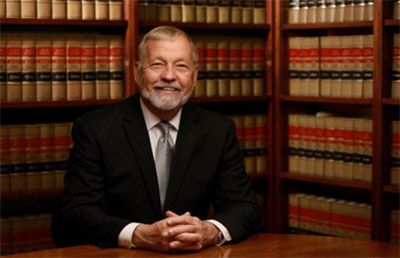
Workplace injuries are a common occurrence.
You might have one of the most dangerous jobs in America, or maybe your workplace is fairly hazard-free—but accidents can still happen anywhere.
Each state in the U.S. offers workers’ compensation benefits for most workers—including government employees. The exact benefits available and guidelines to follow vary from state to state but in general, someone who is injured or killed at work can recover workers’ compensation benefits for medical treatment, lost wages, and death benefits for surviving family members.
Title 23 of the Arizona Revised Statutes governs workers’ compensation benefits for individuals who work for the state. This includes any state employees, specific types of volunteers (specified by statute), and employees of all courts in Arizona.
Arizona state and federal government employee statistics
| Number of Arizona state and local government employees (excluding education employment) |
|
|---|---|
| State and local full-time equivalent (LTE) employees | 128,803 |
| State and local FTEs per 10,000 people | 191 |
| State government FTEs | 42,076 |
| State FTEs per 10,000 people | 63 |
| Number of federal employees in Arizona | |
| Total federal jobs in Arizona | 55,433 |
| Total civilian employment (excluding U.S. Postal Service) | 32,591 |
| Full-time and permanent civilian employment | 27,576 |
| Other civilian employment | 5,015 |
| Postal service employment | 9,520 |
| Active military duty | 18,855 |
| National Guard and reserves | 14,995 |
Source: Governing.com, States with Most Government Employees: Totals and Per Capita Rates
Filing an Arizona workers’ compensation claim as a state employee
The system for filing a workers’ compensation claim can be complicated for a worker in any job, but it works a little differently when the employer is a government agency.
An Arizona worker is required to file a workers’ compensation claim within 1 year of the date of their injury. The employer should be notified as soon as possible that an injury happened.
The injured worker must complete a Worker’s Report of Injury and send it to the Industrial Commission of Arizona (ICA) in order to file a claim. You might also have a Worker’s and Physician’s Report of Injury form that you complete at your doctor’s office. This can also serve as filing a claim once the doctor submits the form to the ICA, a copy to your employer, and a copy to your employer’s workers’ compensation insurer.
Once the ICA receives the form, the employer’s insurance carrier is notified of the claim and has 21 days to accept or deny.
Arizona offers 2 types of workers’ compensation claims: medical only and time loss. You can claim one or both, depending on whether you need coverage only for medical expenses or for both medical costs and lost wages from time off of work.
If you file a medical only claim, the insurance company will pay your medical bills until your treatment for the work-related injury is complete.
A time loss claim provides benefits if you’re unable to return to work for more than 7 days. You can recover benefits for all lost wages after the 7th day, though the first 7 days aren’t paid unless you miss 14 days of work. You’ll receive two-thirds (66.67%) of your average monthly wage based on how much you earned in the 30-day period prior to the injury. This benefit cannot exceed $4,888.56 per month in 2020, but it changes each year.
Workers’ compensation for federal employees
The federal government is also a major employer in Arizona.
| Federal government jobs in Arizona | |
|---|---|
| Agency | Number of employees in Arizona |
| Department of Veterans Affairs | 8,718 |
| Indian Health Service | 4,123 |
| Department of the Army | 3,584 |
| Department of the Air Force | 3,175 |
| Department of Agriculture | 2,329 |
| Indian Affairs | 1,665 |
| Department of Defense | 1,188 |
| National Park Service | 1,075 |
| Social Security Administration | 680 |
| Department of the Navy | 566 |
| Customs & Border Protection | 562 |
| Federal Aviation Administration | 528 |
| Department of Commerce | 509 |
| Bureau of Prisons/Federal Prison System | 450 |
| Bureau of Land Management | 431 |
| U.S. Census Bureau | 402 |
| Bureau of Reclamation | 345 |
| Executive Office and Offices of the U.S. Attorneys | 283 |
| Geological Survey | 274 |
| Department of Energy | 261 |
| Internal Revenue Service | 184 |
| Immigration and Customs Enforcement | 172 |
| Office of Secretary of Health and Human Services | 149 |
| U.S. Fish and Wildlife Service | 135 |
| Department of State | 133 |
Source: Governing.com, Federal Employees by State
Workers’ compensation works differently for federal employees than for state employees or workers for private employers.
Federal employees receive workers’ compensation benefits under the Federal Employees Compensation Act (FECA). This law guarantees that an injured federal worker may return to their same job or an equal job following their recovery from the injury and they will receive all of the same rights and benefits as they would if they had never left. Benefits are administered by the Department of Labor’s Office of Workers’ Compensation Programs (OWCP).
Just like other workers’ compensation benefits, FECA provides payment to a federal worker who suffers a work-related injury for medical treatment, lost wages, and death benefits for survivors. The injured employee is permitted to seek treatment from the physician of their choice, although the federal agency employer may require an examination by a specific doctor in order to verify a diagnosis and determine employability.
If the federal employee is unable to do their job after an injury, they can be placed on leave without pay, but they will receive benefits. The obligation for rehire exists from the agency where the employee worked at the time of the injury, but there’s no obligation for any other federal agency to hire that person after their recovery.
If a federal worker has a disabling, traumatic injury, they may request regular pay for up to 45 days. If the disability requires more than 45 days’ recovery, they can use sick or annual leave, or they can take leave without pay and claim compensation.
Compensation for lost wages can be paid after a 3-day waiting period unless the diagnosis involves permanent effects or it’s expected that they won’t be able to return to work for more than 14 days. In most cases, benefits are two-thirds of the employee’s salary if they have no dependents and three-quarters of their salary if there are dependents.
Job restoration rights under FECA
Job restoration — the right to return to your job — is one of the differences between workers’ benefits from the federal government and non-federal employees.
Your restoration rights are triggered if you are no longer receiving compensation because you’re considered fully recovered (have reached maximum medical improvement) and can return to your former job without limitations.
There are 4 categories of restoration rights:
- Fully recovered within 1 year. If you recovered within a year from when you began receiving benefits, the federal agency is required to restore you to the position you left — or an equivalent job.
- Fully recovered after 1 year. If your recovery time requires more than a year, you receive priority consideration for your former job or an equivalent position if you apply within 30 days from the last day you received compensation.
- Physically disqualified. If you’re no longer physically able to complete the job you left but can do other work, you can be placed in a job that’s as similar to your former role as possible.
- Partially recovered. If you can work in some capacity, you’re able to be considered for a position within reasonable commuting distance from the area of your last job. There’s no absolute right, but the agency must make an effort to find you a comparable job. This is with the expectation that you’ll eventually recover to the level you were prior to the injury. A person who is physically disqualified has a permanent medical condition and is not expected to be able to resume their former role.
FECA death benefits
If a federal employee dies as a result of a work-related accident or illness, their child or surviving spouse is eligible for death benefits.
Each child can receive 15% of the deceased’s pay at the time of their death. The surviving spouse would receive 45%.
If there are children but no spouse, the first child would get 40% and the remaining children would get 15% each, to be divided equally. If there’s a spouse but no children, the spouse would receive 50% of the worker’s pay at the time of death.
If there are no children and no spouse, other relatives who are financially dependent could be entitled to benefits, but not more than 75% of the employee’s salary.
The family may also receive burial costs up to $800, along with transportation of the body to the deceased worker’s U.S. residence if the death happens elsewhere.
What to do if you’ve been injured in a work-related accident in Arizona
Whether you’re a state, local, or federal employee, or an employee of a private employer, you’re entitled to recover expenses if you were injured on the job. You shouldn’t have to shoulder that burden alone.
Especially if your work-related accident has left you with long-term medical expenses, permanent disability injuries, ongoing time off from work or other future costs, you might need an Arizona workers’ compensation lawyer to make sure you’re receiving the full benefits to which you’re entitled.




Esko- L says
How knowledgeable are the Worker’s Compensation attorneys towards this new pandemic? What is being done to fight cases where the employee has been exposed to the virus at work and the employer refuses to accommodate even though the exposure happened at work? What are the possibilities of the pandemic being approved as a disability through the Social Security office if there have been lingering symptoms that interfere with everyday living, months after the exposure? What is being done to help those called “Long haulers”?
Ian Pisarcik says
Great questions!
Workers’ compensation attorneys are very aware of the impact of COVID-19 on the workplace.
We have explored COVID-19 and the law generally in our Legal Guide to COVID-19 Injuries and Lawsuits. What’s more, we interviewed Arizona attorney Bob Wisniewski about the role of COVID-19 on his workers’ compensation practice.